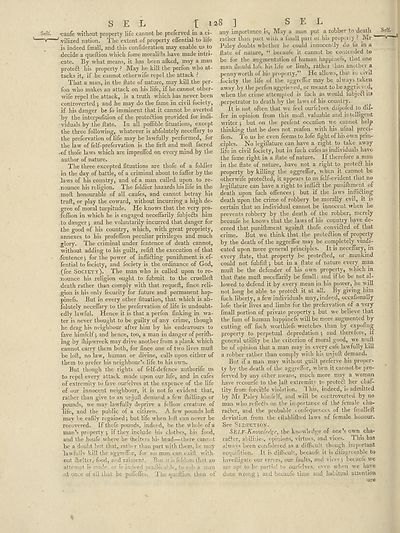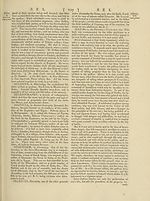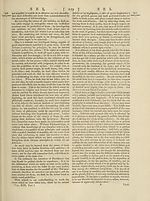Encyclopaedia Britannica, or, a Dictionary of arts, sciences, and miscellaneous literature : enlarged and improved. Illustrated with nearly six hundred engravings > Volume 19, Scripture-SUG
(138) Page 128
Download files
Complete book:
Individual page:
Thumbnail gallery: Grid view | List view

S E L [
Self. <caufe mthout property life cannot be preferved in a ci-
—“v vilized nation. The extent of property effential to life
is indeed fmall, and this confideration may enable us to
decide a quellion which fome moralifls have made intri¬
cate. By what means, it has been alked, may a man
proteft his property ? May he kill the perfon who at¬
tacks it, if he cannot otherwife repel the attack ?
That a man, in the date of nature, may kill the per¬
fon who makes an attack on his life, if he cannot other-
wife repel the attack, is a truth which has never been
controverted ; and he may do the fame in civil fociety,
if his danger be fo imminent that it cannot be averted
by the interpofition of the protedHon provided for indi¬
viduals by the date. In all podible fituations, except
the three following, whatever is abfolutely neceffary to
the prefervation of life may be lawfully performed, for
the law of felf-prefervation is the fird and mod facred
-of thofe laws which are imprefled on every mind by the
author of nature.
The three excepted fituations are thofe of a foldier
in the day of battle, of a criminal about to differ by the
laws of his country, and of a man called upon to re¬
nounce his religion. The foldier hazards his life in the
mod honourable of all caufes, and cannot betray his
trud, or play the coward, without incurring a high de¬
gree of moral turpitude. He knows that the very pro-
feffion in which he is engaged neceffarily fubjefts him
to danger j and he voluntarily incurred that danger for
the good of his country, which, with great propriety,
annexes to his profeffion peculiar privileges and much
glory. The criminal under fentence of death cannot,
without adding to his guilt, refid the execution of that
fentence j for the power of infli&ing punilhment is ef¬
fential to fociety, and fociety is the ordinance of God,
(fee Society). The man who is called upon to re¬
nounce his religion ought to fubmit to the cruelled
death rather than comply with that requed, fince reli¬
gion is his only fecurity for future and permanent hap-
pinefs. But in every other fituation, that which is ab¬
folutely neceffary to the prefervation of life is undoubt¬
edly lawful. Hence it is that a perfon finking in wa¬
ter is never thought to be guilty of any crime, though
he drag his neighbour after him by his endeavours to
fave himfelf •, and hence, too, a man in danger of peridi-
ing by fhipwreck may drive another from a plank which
cannot carry them both, for fince one of two lives muft
be lod, no law, human or divine, calls upon either of
them to prefer his neighbour’s life to his own.
But though the rights of felf-defence authorife us
to repel every attack made upon our life, and in cafes
of extremity to fave ourfelves at the expenee of the life
of our innocent neighbour, it is not fo evident that,
rather than give to an unjud demand a few {hillings or
pounds, we mav lawfully deprive a fellow creature of
life, and the public of a citizen. A few pounds lod
may be eafily regained; but life when lod can never be
recovered. If thefe pounds, indeed, be the Whole of a
man’s property *, if they include Iris clothes, his food,
and the houfe where he {belters his head—there cannot
be a doubt but that, rather than part with them, he may
lawfullv kill the aggrefior, for no man can exid with¬
out {belter, food, and raiment. But it isfeldom that an
attempt is made or is indeed practicable, to rob a man
at once of all that he poffeffes. The quedion then of
1 28 ]
S E L
any importance is, May a man put a robber to death
rather than part with a {mail part 01 his property ? Mr *“
Paley doubts whether he could innocently do io in a
date of nature, “ becaufe it cannot be contended to
be for the augmentation of human happinei's, that one
man diould loft his life or limb, rather than another a
pennyworth of his property.” He allows, that in civil
foeiety the life of the aggreffor may be always taken
away by the perfon aggrieved, or meant to be aggriev;. d,
when the crime attempted is fuch as would fubjeft its
perpetrator to death by the laws of his country.
It is not often that we feel ourfclves difpofed to dif¬
fer in opinion from this mod valuable and intelligent
writer 5 but on the prefent occafion we cannot help
thinking that he does not reafon with his ufual preci-
fion. To us he even feems to lofe dght of his own prin¬
ciples. No legifiature can have a right to take away
life in civil fociety, but in fucli cafes as individuals have
the fame right in a date of nature. If therefore a man
in the date of nature, have not a right to protect his
property by killing the aggreffor, when it cannot be
otherwife protedled, it appears to us felf-evident that no
legidature can have a right to inflift the punidnnent ot
death upon fuch offences; but if the laws inflicling
death upon the crime of robbery be morally evil, it is
certain that an individual cannot be innocent when he
prevents robbery by the death of the robber, merely
becaufe he knows that the laws of his country have de¬
creed that punidiment againft thofe convi&ed of that
crime. But we think that the prote&ion of property
by the death of the aggreffor may be completely vindi¬
cated upon more general principles. It is neceffary, in
every Hate, that property be prote£ted, or mankind
could not fubfid ; but in a date of nature every man
mud be the defender of his own property, which in
that date mud neceffarily be fmall: and if he be not al¬
lowed to defend it by every mean in his power, he will
not long be able to proteft it at all. By giving him
fuch liberty, a few individuals may, indeed, occafionally
lofe their lives and limbs for the prefervation of a very
fmall portion of private property } but we believe that
the fum of human happinefs will be more augmented by
cutting off fuch worthlefs wretches than by expofing
property to perpetual depredation •, and therefore, if
general utility be the criterion of moral good, we mud
be of opinion that a man may in every cafe lawfully kill
a robber rather than comply with his unjud demand.
But if a man may without guilt preferve his proper¬
ty by the-death of the aggreffor, when it cannot be pre¬
ferved by any other means, much more may a woman
have recourfe to the lad extremitv to protedl her chaf-
tity from forcible violation. 1 his, indeed, is admitted
by Mr Paley himfelf, and will be controverted by no
man who refiefts on the importance of th(? female cha-
rabler, and the probable eonfequences of the fmalled
deviation from the edablifhed laws of female honour.
See Seduction.
SELF-Knowledge, the knowledge of one’s own cha-
rafter, abiliiie-, opinions, virtues, and vices. 1 his has
always been confidered as a difficult though important
acquifition. It is ditfieult, becanfe it is difagreeable to
invedigate our errors, our faults, and vices •, becaufe we
are apt to be partial to ourfelves. even when we have
dune wrong j and becaufe time and habitual attention
•are
Self.
7
Self. <caufe mthout property life cannot be preferved in a ci-
—“v vilized nation. The extent of property effential to life
is indeed fmall, and this confideration may enable us to
decide a quellion which fome moralifls have made intri¬
cate. By what means, it has been alked, may a man
proteft his property ? May he kill the perfon who at¬
tacks it, if he cannot otherwife repel the attack ?
That a man, in the date of nature, may kill the per¬
fon who makes an attack on his life, if he cannot other-
wife repel the attack, is a truth which has never been
controverted ; and he may do the fame in civil fociety,
if his danger be fo imminent that it cannot be averted
by the interpofition of the protedHon provided for indi¬
viduals by the date. In all podible fituations, except
the three following, whatever is abfolutely neceffary to
the prefervation of life may be lawfully performed, for
the law of felf-prefervation is the fird and mod facred
-of thofe laws which are imprefled on every mind by the
author of nature.
The three excepted fituations are thofe of a foldier
in the day of battle, of a criminal about to differ by the
laws of his country, and of a man called upon to re¬
nounce his religion. The foldier hazards his life in the
mod honourable of all caufes, and cannot betray his
trud, or play the coward, without incurring a high de¬
gree of moral turpitude. He knows that the very pro-
feffion in which he is engaged neceffarily fubjefts him
to danger j and he voluntarily incurred that danger for
the good of his country, which, with great propriety,
annexes to his profeffion peculiar privileges and much
glory. The criminal under fentence of death cannot,
without adding to his guilt, refid the execution of that
fentence j for the power of infli&ing punilhment is ef¬
fential to fociety, and fociety is the ordinance of God,
(fee Society). The man who is called upon to re¬
nounce his religion ought to fubmit to the cruelled
death rather than comply with that requed, fince reli¬
gion is his only fecurity for future and permanent hap-
pinefs. But in every other fituation, that which is ab¬
folutely neceffary to the prefervation of life is undoubt¬
edly lawful. Hence it is that a perfon finking in wa¬
ter is never thought to be guilty of any crime, though
he drag his neighbour after him by his endeavours to
fave himfelf •, and hence, too, a man in danger of peridi-
ing by fhipwreck may drive another from a plank which
cannot carry them both, for fince one of two lives muft
be lod, no law, human or divine, calls upon either of
them to prefer his neighbour’s life to his own.
But though the rights of felf-defence authorife us
to repel every attack made upon our life, and in cafes
of extremity to fave ourfelves at the expenee of the life
of our innocent neighbour, it is not fo evident that,
rather than give to an unjud demand a few {hillings or
pounds, we mav lawfully deprive a fellow creature of
life, and the public of a citizen. A few pounds lod
may be eafily regained; but life when lod can never be
recovered. If thefe pounds, indeed, be the Whole of a
man’s property *, if they include Iris clothes, his food,
and the houfe where he {belters his head—there cannot
be a doubt but that, rather than part with them, he may
lawfullv kill the aggrefior, for no man can exid with¬
out {belter, food, and raiment. But it isfeldom that an
attempt is made or is indeed practicable, to rob a man
at once of all that he poffeffes. The quedion then of
1 28 ]
S E L
any importance is, May a man put a robber to death
rather than part with a {mail part 01 his property ? Mr *“
Paley doubts whether he could innocently do io in a
date of nature, “ becaufe it cannot be contended to
be for the augmentation of human happinei's, that one
man diould loft his life or limb, rather than another a
pennyworth of his property.” He allows, that in civil
foeiety the life of the aggreffor may be always taken
away by the perfon aggrieved, or meant to be aggriev;. d,
when the crime attempted is fuch as would fubjeft its
perpetrator to death by the laws of his country.
It is not often that we feel ourfclves difpofed to dif¬
fer in opinion from this mod valuable and intelligent
writer 5 but on the prefent occafion we cannot help
thinking that he does not reafon with his ufual preci-
fion. To us he even feems to lofe dght of his own prin¬
ciples. No legifiature can have a right to take away
life in civil fociety, but in fucli cafes as individuals have
the fame right in a date of nature. If therefore a man
in the date of nature, have not a right to protect his
property by killing the aggreffor, when it cannot be
otherwife protedled, it appears to us felf-evident that no
legidature can have a right to inflift the punidnnent ot
death upon fuch offences; but if the laws inflicling
death upon the crime of robbery be morally evil, it is
certain that an individual cannot be innocent when he
prevents robbery by the death of the robber, merely
becaufe he knows that the laws of his country have de¬
creed that punidiment againft thofe convi&ed of that
crime. But we think that the prote&ion of property
by the death of the aggreffor may be completely vindi¬
cated upon more general principles. It is neceffary, in
every Hate, that property be prote£ted, or mankind
could not fubfid ; but in a date of nature every man
mud be the defender of his own property, which in
that date mud neceffarily be fmall: and if he be not al¬
lowed to defend it by every mean in his power, he will
not long be able to proteft it at all. By giving him
fuch liberty, a few individuals may, indeed, occafionally
lofe their lives and limbs for the prefervation of a very
fmall portion of private property } but we believe that
the fum of human happinefs will be more augmented by
cutting off fuch worthlefs wretches than by expofing
property to perpetual depredation •, and therefore, if
general utility be the criterion of moral good, we mud
be of opinion that a man may in every cafe lawfully kill
a robber rather than comply with his unjud demand.
But if a man may without guilt preferve his proper¬
ty by the-death of the aggreffor, when it cannot be pre¬
ferved by any other means, much more may a woman
have recourfe to the lad extremitv to protedl her chaf-
tity from forcible violation. 1 his, indeed, is admitted
by Mr Paley himfelf, and will be controverted by no
man who refiefts on the importance of th(? female cha-
rabler, and the probable eonfequences of the fmalled
deviation from the edablifhed laws of female honour.
See Seduction.
SELF-Knowledge, the knowledge of one’s own cha-
rafter, abiliiie-, opinions, virtues, and vices. 1 his has
always been confidered as a difficult though important
acquifition. It is ditfieult, becanfe it is difagreeable to
invedigate our errors, our faults, and vices •, becaufe we
are apt to be partial to ourfelves. even when we have
dune wrong j and becaufe time and habitual attention
•are
Self.
7
Set display mode to:
![]() Universal Viewer |
Universal Viewer | ![]() Mirador |
Large image | Transcription
Mirador |
Large image | Transcription
Images and transcriptions on this page, including medium image downloads, may be used under the Creative Commons Attribution 4.0 International Licence unless otherwise stated. ![]()
| Permanent URL | https://digital.nls.uk/192697076 |
|---|
| Attribution and copyright: |
|
|---|
| Description | Ten editions of 'Encyclopaedia Britannica', issued from 1768-1903, in 231 volumes. Originally issued in 100 weekly parts (3 volumes) between 1768 and 1771 by publishers: Colin Macfarquhar and Andrew Bell (Edinburgh); editor: William Smellie: engraver: Andrew Bell. Expanded editions in the 19th century featured more volumes and contributions from leading experts in their fields. Managed and published in Edinburgh up to the 9th edition (25 volumes, from 1875-1889); the 10th edition (1902-1903) re-issued the 9th edition, with 11 supplementary volumes. |
|---|---|
| Additional NLS resources: |
|

